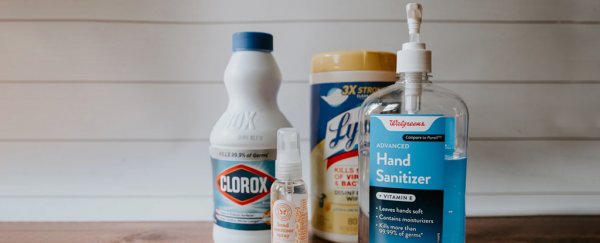With so many people experiencing heartbreaking losses in this pandemic, it's only natural we all want to do everything in our power to protect ourselves and those we love. Unfortunately, in some instances, our desire to defend against COVID-19 is creating even more health problems.
The US Centers for Disease Control and Prevention (CDC) has just released a report revealing a rise in calls to poison helplines. This rise coincides with increased media coverage of COVID-19, as the first case was reported in the US on 19 January 2020.
While the researchers stress they cannot yet demonstrate a direct link between these chemical exposures and efforts to prevent COVID-19, the CDC reports 20 percent more calls about concerning exposures to cleaning products and disinfectants, compared with calls made in early 2019.
They compared the number of calls to 55 poison control centres between January and March 2020 to the same periods in 2019 and 2018. By comparison, reports made in early 2018 were lower than this year's, by around 16 percent.
The biggest surge in reports occurred at the beginning of March 2020. For the cleaning products, bleaches account for the largest percentage of the rise, while non-alcoholic disinfectants and hand sanitisers dominated the disinfectant category.
"The timing of these reported exposures corresponded to increased media coverage of the COVID-19 pandemic, reports of consumer shortages of cleaning and disinfection products, and the beginning of some local and state stay-at-home orders," they wrote.
 Rise in reported exposures to poisonous chemicals. (CDC)
Rise in reported exposures to poisonous chemicals. (CDC)
Even before the current rises, concerns for children under the age of five represented the largest portion of calls. This continues to be true, as chemical exposure cases across all ages increased this year, with up to half of all calls concerning young children. The case study provided by the CDC report shows just how frightening such a situation can be.
After eating an unknown amount of an ethanol-based hand sanitiser, a preschool child became dizzy and hit her head in a fall. Paramedics found her unresponsive when they responded to her parents' 911 call and rushed her to hospital.
There, staff found her blood alcohol level to be 273 milligrams per decilitre, over triple the legal driving limit for adults in most US states, which is 80 milligrams per decilitre. Luckily, after overnight admission to the paediatric intensive care unit, the young patient recovered.
Earlier in March, Rutgers University microbiologist and food safety expert Donald Schaffner warned how dangerous washing food with soap could be.
"There's a bunch of people out there recommending you wash your fresh produce with soap. This is not a good idea. Soap is known to cause vomiting and or diarrhoea," he explained on Metafact.
And in their other case example, the CDC report illustrates just how perilous fears of contracting COVID-19 through groceries can become.
After hearing on the news that groceries should be cleaned before eating, an adult woman tried to clean her produce with diluted bleach and hot water; unfortunately, heat increases the release of chlorine fumes. She experienced coughing, wheezing and trouble breathing, ending up requiring oxygen and bronchodilators in hospital to restore her blood oxygen levels back to normal.
These inadvertent poisonings highlight the dangers of unclear advice and the need for us all to be cautious about who we choose to listen to. As we've all witnessed, the rapidly shifting nature of this emergency can make this challenging, as even political leaders and medical experts can provide conflicting and even dangerous advice.
So it pays to be highly sceptical about the information you see on the internet, and even in the news. When in any doubt, the safest bet is always to check directly with leading world health authorities such as the CDC and World Health Organization.
For now, when it comes to clearing and disinfectant products, the CDC advises the following:
- always read and follow directions on the label;
- only use water at room temperature for dilution (unless stated otherwise on the label);
- avoid mixing chemical products;
- wear eye and skin protection;
- ensure adequate ventilation;
- store chemicals out of the reach of children.
It is also important to be aware that there is no evidence of anyone contracting COVID-19 through food. And, as Schaffner advises, only use cold water to wash your fruit and vegetables. Take care out there.
These findings were published in the CDC's Morbidity and Mortality Weekly Report.
